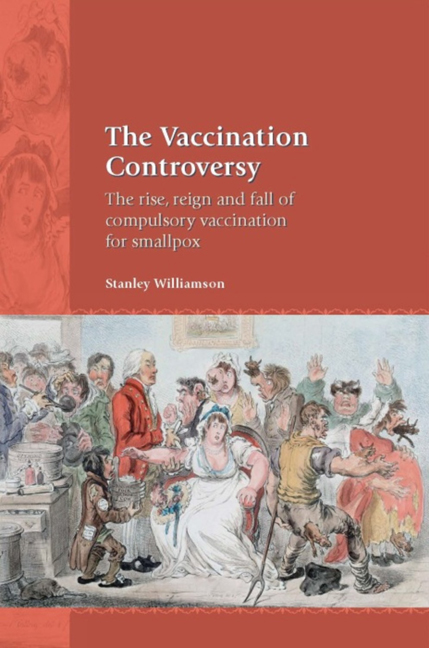Book contents
- Frontmatter
- Dedication
- Epigraph
- Contents
- Acknowledgements
- Part I The Road to Compulsion
- 1 The Byzantine Operation
- 2 The Small Pockes
- 3 The Engrafted Distemper
- 4 The Language of Figures
- 5 The Suttonian System
- 6 The Great Benefactor
- 7 The Speckled Monster
- 8 The Three Bashaws
- 9 A Competent and Energetic Officer
- 10 Formidable Men
- 11 The Present Non-System
- 12 Toties Quoties
- 13 Crotchety People
- Part II The Reign of Compulsion
- Part III The Retreat from Compulsion
- Notes
- Bibliography
- Index
8 - The Three Bashaws
from Part I - The Road to Compulsion
- Frontmatter
- Dedication
- Epigraph
- Contents
- Acknowledgements
- Part I The Road to Compulsion
- 1 The Byzantine Operation
- 2 The Small Pockes
- 3 The Engrafted Distemper
- 4 The Language of Figures
- 5 The Suttonian System
- 6 The Great Benefactor
- 7 The Speckled Monster
- 8 The Three Bashaws
- 9 A Competent and Energetic Officer
- 10 Formidable Men
- 11 The Present Non-System
- 12 Toties Quoties
- 13 Crotchety People
- Part II The Reign of Compulsion
- Part III The Retreat from Compulsion
- Notes
- Bibliography
- Index
Summary
Even when the complex series of alliances and wars against the French ended with the final overthrow of Napoleon (an ardent admirer of Jenner), social unrest and the urgent need to contain it remained a constant preoccupation of successive governments. The year of the serious epidemic of smallpox in Norwich, 1819, was also the year of the Peterloo massacre in Manchester, with all that it implied for the current state of the nation, and there can be little doubt as to which event ranked as the more important in ministerial minds. During these years, when smallpox appeared, albeit slowly, to be loosening its grip on the population, apart from occasional displays of violence such as the epidemic that swept the country in 1825, the most insidious sickness affecting British society, more significant in its long-term effects perhaps than the electoral reform of 1832, was the steadily increasing growth of poverty. This was leading in many areas to chronic pauperism, especially in the southern agricultural counties, and a correspondingly increasing cost of trying to address this with an outmoded and creaking system of relief.
Random legislation first codified in late Elizabethan times prescribed measures for lightening the burden of the poor both on themselves and on their better-off compatriots. These had worked tolerably well for the better part of two centuries, but the stresses and upheaval created by the rapid evolution of an industrialized society, especially in rural communities, disrupted what had always been a somewhat uneven balance. By the 1820s the complaint heard in many quarters was that the national economy was in danger of collapsing beneath the burden of taxation in the form of poor rates levied on householders, which it was claimed were steadily reducing them to poverty themselves. The upshot, following the devastating report of the royal commission set up to investigate the situation, was the legislation known officially as the Poor Law Amendment Act of 1834 but popularly referred to as the New Poor Law. As with the report of the royal commission it was drafted almost entirely by the energetic reformer Edwin Chadwick and the radical economist Nassau Senior, who claimed to have written most of it himself. It does not call for detailed analysis here but certain of its major provisions need to be singled out.
- Type
- Chapter
- Information
- The Vaccination ControversyThe Rise, Reign and Fall of Compulsory Vaccination for Smallpox, pp. 107 - 119Publisher: Liverpool University PressPrint publication year: 2007



